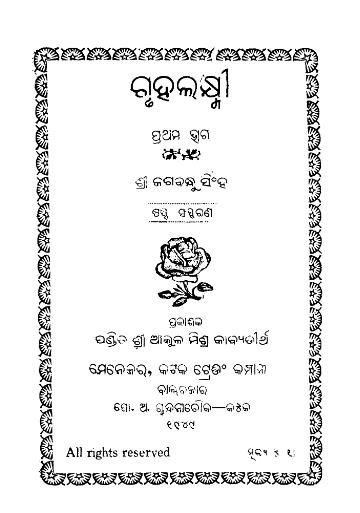society. This book, presented in a dialogue format, offers a refreshing perspective on the challenges and triumphs faced by women in the household, making it both a relatable and insightful read.
Gruhalaksmi Part-1 is structured around engaging dialogues that bring to life the voices of various characters, primarily focusing on women and their experiences. Jagabandhu Simha’s choice of dialogue as a narrative style is particularly effective in cultivating a sense of intimacy and realism. Readers are drawn into conversations that reflect genuine emotions, cultural nuances, and the everyday struggles of women. This stylistic choice not only enhances the readability of the text but also allows for a deeper connection with the characters.
Simha’s language is vibrant and expressive, capturing the essence of Odia culture while employing idiomatic expressions that resonate with local readers. The dialogues are crafted with care, revealing layers of meaning behind the spoken words and illustrating the complexities of relationships within the household.
At its core, Gruhalaksmi Part-1 addresses the themes of gender roles, family dynamics, and societal expectations. The dialogues delve into the lives of women as they navigate their responsibilities, aspirations, and the commonly imposed limitations placed upon them. This exploration is crucial in highlighting the transformative power of education and self-awareness for women during a time when societal norms often restricted their potential.
The book also emphasizes the importance of family unity and support. Through interactions among family members, Simha illustrates how love, understanding, and communication can foster a nurturing environment. These dialogues serve as a reminder of the strength found in familial bonds and the collective effort required to overcome adversities.
Gruhalaksmi Part-1 is not just a narrative about domestic life; it is also a reflection of the socio-cultural landscape of Odisha in the mid-20th century. The book captures the essence of Odia traditions, rituals, and the daily lives of its people, making it a valuable piece of literature for understanding the period’s social fabric.
Simha deftly weaves in cultural references, showcasing everyday practices and values that define Odia society. This cultural immersion enriches the reader’s experience and fosters a sense of pride in regional heritage, making the book a significant contribution to Odia literature.
Books Info
| Books name | Gruhalaksmi Part-1 / ଗୃହଲକ୍ଷ୍ମୀ |
| Author | Jagabandhu Simha |
| No Of pages | 176 |
| Publisher | Pandit Sri Akula Mishra |
| Publication | 1949 |
| Printed At | NA |
| Distributor | NA |

